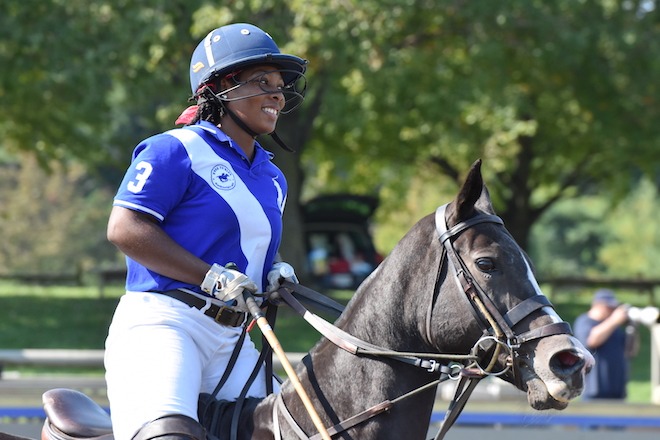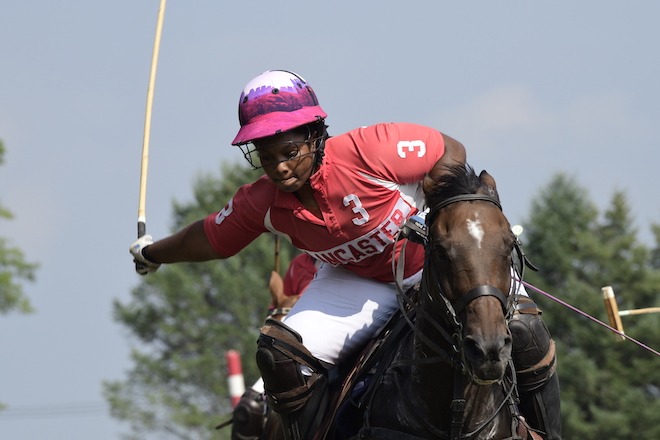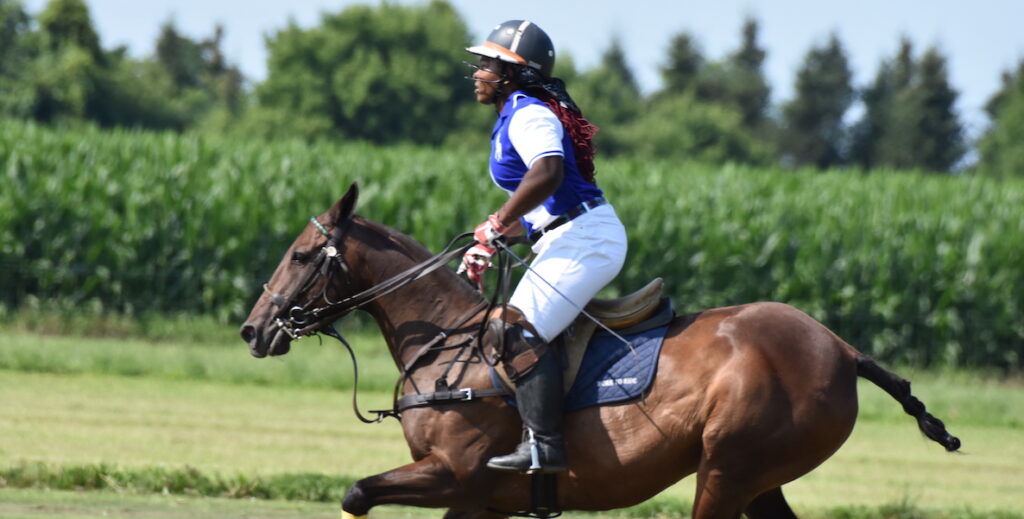If there were boxes to tick to become a spokesperson for a brand, Shariah Harris would tick them all for Ralph Lauren. Professional polo player who captains most teams she plays on? Check. African American trailblazer? Check. Ivy League graduate? Check. Already appeared in a Ralph Lauren-sponsored story? Looks amazing riding a horse and swinging a mallet while wearing a short-sleeved, jersey knit collared shirt, also known as a polo, and as embroidered on every Ralph Lauren polo shirt? Check again.
Ralph, if you’re listening, Harris (who, if there were also a box for an ER nurse from far West Philly, would tick it too) is willing to entertain your offer. But she’s not waiting around for it. If you want to reach her this weekend, you can find her in the featured match of Philadelphia’s third annual Polo Classic, perhaps the world’s most diverse and fun polo event — and definitely the only one held on Edgley Field in Fairmount Park.

How she got here is quite a story. What she’s helping to do for other Philadelphians via polo is pretty remarkable too.
Harris’ Work to Ride story
How it started: The story goes that Harris was 8 years old, sitting in the backseat, her mom at the wheel, lost in West Fairmount Park. They ended up at Work to Ride’s Chamounix stables, where Harris saw Black kids on horseback hitting balls with long mallets, and was like: I want to do that!
In a few years, Harris and her two siblings were enrolled in Work to Ride, heading to Chamounix after school and on weekends from grades 5 through 12, learning to care for and ride and play a sport on horses while wearing hand-me down jodhpurs, boots and helmets, falling a bunch, breaking some mallets — becoming polo players.
“What had me fall in love with polo was the horses, of course, but also how fast you can go,” Harris says. The sport’s “speed and physicality really drew me in. As soon as I tried it, I fell in love.”

Didn’t hurt that the older World to Ride students, Black kids like Harris, were crushing it. “I grew up watching the boys play,” says Shariah. “We were there when they won their first National High School Championship.” That 2011 team starred Daymar Rosser, Brandon Rease and Kareem Rosser, who became that year’s Interscholastic Polo Player of the Year and is now a financial analyst, Work to Ride’s executive V.P. and the co-founder of the Polo Classic. Five years later, Harris would go on to earn the same award as Kareem — the U.S. Polo Association’s National Interscholastic Player of the Year.
Work to Ride’s is Philadelphia’s only high school polo team, composed of players from various city schools repping all of Philly. (Much like Philly’s only public school crew team.)
“In high school, there’s a girls’ team and there’s an open team. Women can play with the men in the open. When I first started playing, I played on the girls team, but eventually we didn’t have enough girls, so I played on the open teams,” she says. In college — Cornell University, full ride — rules dictate women and men play apart.
As a pro, however, polo remains largely male-dominated. Although Harris has faced occasional pushback for competing in open matches alongside men, for a long time, she preferred it.
“Playing on the open team really brought out the physical aspect in me that I loved,” she says. “I had to play quicker, hit harder and keep up with the boys.” Over the past few years, women’s polo has become more competitive, however — and she relishes it. Today, “sometimes I have faster women’s games than open games.” Harris’ brother Marc continues to play too; their sister no longer plays.
Her usual position: back, a defender who does much of the play-calling — the team’s unofficial defensive captain. Earlier this year, Harris became the first African American to compete in the U.S. Open Women’s Polo Championship. (Later this year, she became The Philadelphia Citizen’s Rad Athlete of the Year.)
Harris’ achievements have brought more attention to the place she first learned to play.
Work to Ride and the Polo Classic
Lezlie Hiner founded Work to Ride in 1994. She says while girls are much more likely to ride in general, polo crosses genders with its fast-paced, “risk taking” competition. “Polo hits all those notes.” Work to Ride participants must live in Philadelphia, meet income criteria, maintain a C grade point average, and show up on time, day after day. There are currently 12 kids in the core program. About 400 to 500 more take lessons or participate in other ways.
For the most dedicated polo playing students, “one of their biggest obstacles is transportation,” Hiner says. The program is “really fortunate that the two neighborhoods that we service — West Philly on one side and North Philly on the other — have bus stops less than a mile away.” Lots of parents, like Harris’ mom, drive their kids — not just to practice, but also to weekend tournaments, most often in Lancaster.
Another obstacle: No indoor arena. That’s where the Polo Classic comes in. While Work to Ride gets grants and has some notable benefactors, including Melissa and Marc Ganzi, Penn grads with polo clubs in Wellington, FL and Aspen, CO, they are still fundraising to build a state-of-the-art, 45,000 square feet indoor facility with a $13 million price tag. All proceeds from the Polo Classic, which includes two matches, one for Work to Ride students and alumni, the other for professionals, including top American player (and Wilhelmina model) Nic Roldan, go toward the project. Buy a $50 ticket, and you’ll be supporting a noble cause.
No worries about getting Richard Gere to buy you a polka dotted dress to wear, brushing up on your British royalty etiquette, or being the only person of color at the affair. “The Polo Classic is the most diverse polo event I’ve ever been to — and I’ve been to a lot,” says Hiner. Although the spectators do tend to dress … fit, they’re still Philly sports fans, engaged in the competition, cheering on their own. “They love seeing people that look like them out on the field,” adds Hiner. “People are just ecstatic … The whole day is electric.”
The all-afternoon event includes a doggie divot stomp, contests for best hat, best-dressed people and best-dressed … dog. There’s ample food and drink, and pony stick races for kids and adults, where spectators straddle blow-up equines and amble to a finish line. “We figure by the second half of the day, people will have enough juice that the adults will be really funny to watch,” says Hiner.
Harris, who’s played polo pretty much everywhere in the U.S., says the day feels both entirely accessible and every bit as elegant as any other fancy match she’s taken part in. “They really recreated scenes that we’re used to seeing in more affluent areas that you would associate with polo,” she says. “Everyone that I ran into had a great time.” Although it “didn’t feel like it was in Philly at all,” it did feel a lot like how Philly can be, if we want.
MORE RAD PHILADELPHIA WOMEN

